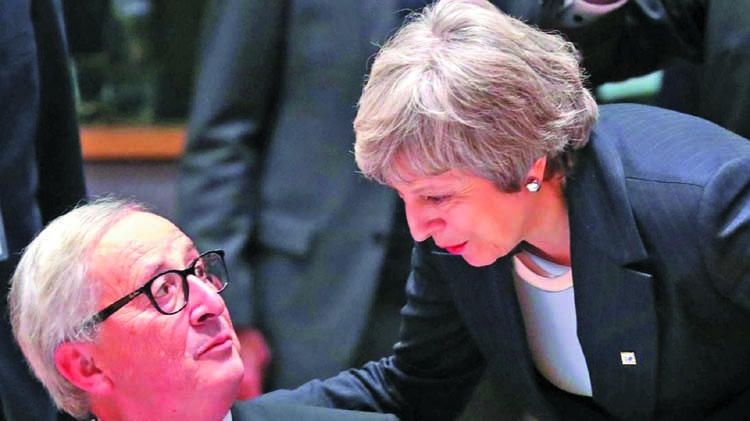EU says no to May

European Union leaders have said the Brexit withdrawal agreement is "not open for renegotiation", after appeals from Theresa May. She wants legal assurances on the Irish backstop to help her deal get through Parliament, after she delayed a Commons vote in anticipation of defeat.
The PM said the deal was "at risk" if MPs' concerns could not be addressed. European Commission president Jean-Claude Juncker said there could be clarifications but no renegotiation.
He urged the UK to set out more clearly what it wants, adding that the commission will publish information on 19 December on its preparations for a no-deal Brexit. "Our UK friends need to say what they want, instead of asking us to say what we want, and so we would like within a few weeks our UK friends to set out their expectations for us, because this debate is sometimes nebulous and imprecise and I would like clarifications," he said.
May travelled to Brussels to make a special plea to EU leaders at Thursday's summit, but BBC political editor Laura Kuenssberg said it appeared that the meeting went badly and EU leaders doubted her political ability to get the deal through the Commons.
Shadow Brexit Secretary Sir Keir Starmer said May had failed to get meaningful changes and she should reinstate the vote on her deal next week. But Cabinet minister David Lidington described the meeting as a "welcome first step" in showing that the EU was committed "to negotiate a trade deal with the UK speedily".
Theresa May's demands for reassurances on the Irish backstop "were not really clear" when she spoke to EU leaders last night, according to a diplomatic note of the summit seen by the BBC. (1)
The PM's visit came at the end of a week that has seen her first delay the vote on the withdrawal agreement in Parliament, then win a vote of no confidence brought by MPs unhappy with it. She vowed to listen to the concerns of the 37% of Tory MPs who voted against her, and was hoping to "assuage" their concerns about the controversial "backstop" plan in the agreement.
Critics say the backstop - aimed at preventing a hard border in Northern Ireland - would keep the UK tied to EU rules indefinitely and curb its ability to strike trade deals. Conservative MPs demanded changes to the backstop to make it clear that it could not last forever, and the UK could terminate the arrangement on its own.
If this meeting in Brussels was meant to provide Theresa May with the beginnings of an escape route from her Brexit conundrum, the signs are not good. At one of her most vulnerable political moments, Number 10 was hopeful at least of an indication of a potential solution to the most intense of a long list of Brexit problems - the controversial so-called backstop designed to guarantee against a hard Irish border. But right now, that's simply not on offer. EU leaders made plain their warnings that their divorce deal with Britain was not up for negotiation were real.
Requests for change to ease Westminster politics were not fulfilled, with key phrases from a more accommodating draft gone by midnight. But the rejection gives succor perhaps to those in government who want their critics to accept that the prime minister's deal may be genuinely, as good as it gets.
In comments released by Downing Street on Thursday, May urged EU leaders to help her "get this deal over the line" and said she firmly believed it could get through the Commons, saying: "There is a majority in my Parliament who want to leave with a deal so with the right assurances this deal can be passed. Indeed, it is the only deal capable of getting through my Parliament," she said.
May urged EU leaders to work with her to "change the perception" of the controversial backstop plan. European Council president Donald Tusk said the withdrawal agreement was "not open for renegotiation".
But speaking after the Brussels summit, Tusk called the backstop "an insurance policy," saying it was the EU's "firm determination" to work "speedily" on alternative arrangements. Tusk said the backstop would "apply temporarily unless and until it is superseded by a subsequent agreement that ensures that the hard border is avoided".
BBC Brussels reporter Adam Fleming said the fact that the EU said it would use its "best endeavors" to get a future trade deal that would get rid of the need for a backstop - even if the backstop came into force - was seen as important by British officials who said it meant the UK could go to an independent arbitration panel if they felt the EU is dragging its feet.
But he said Ireland had requested that the European Council conclusions be toughened up and a paragraph which suggested further work would be done to reassure the UK was removed because "there was no support" for it and EU leaders rejected the idea of an end-date for the backstop. Austrian Chancellor Sebastian Kurz, whose country holds the rotating EU presidency, suggested there could be a special Brexit summit in January to agree "additional assurances".
Downing Street has confirmed MPs will not now vote on May's deal before Christmas, and said the vote would happen "as soon as possible in January". The Labor former PM Tony Blair told the BBC he believed a majority of MPs in the Commons would back another referendum on Brexit, if Parliament could not agree on another way forward: "I think that will happen if it is clear that there is no majority for any one form of Brexit," he told Radio 4's Today. "We have had 30 months of negotiation and let's be clear - we are in crisis mode on this."
